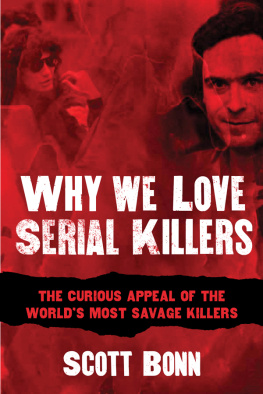
Published by Quetzalcoatl Publishing
Copyright 1993, 2015 Moira Martingale
All rights reserved
Moira Martingale has asserted her right
under the Copyright, Designs and Patents
Act 1988 be identified as the author
of this work
Authors website
www.moiramartingale.com/
ISBN-13 978-1-84396-188-8
This ebook is sold subject to the
condition that it shall not, by way of
trade or otherwise, be copied, lent,
resold, hired out, or otherwise
circulated without the authors
prior consent in any form without
similar conditions being imposed
on the subsequent purchaser.
Ebook production
www.ebookversions.com
Fantasy abandoned by
reason produces impossible monsters;
united with her, she is the mother
of the arts and the origin of their marvels.
Francisco Goya:
Epigraph to Los Caprichos, 1970
Acknowledgements
During my research for the 1993 first edition of this book of which a large part remains in this second, expanded edition a number of people put themselves out on my behalf. Some of them, sadly, are no longer with us.
My thanks go to the FBI Public Affairs department; Lt. Ray Biondi of Sacramento police department; Professor Herschel Prins of Loughborough University; Professor David Dolphin; Graham Nown; and Alan Bott.
This Be The Verse from High Windows by Philip Larkin is reproduced by permission of Faber & Faber Ltd.
CANNIBAL
KILLERS
The Impossible Monsters
Moira Martingale
QUETZALCOATL PUBLISHING
Contents
Overpowering Instinct
Cruelty Amid Chaos
A Cannibal in New York
The Man Who Kept Dolls
The Kiss of the Vampire
Do Mothers Make Monsters?
Few and Evil Have the Years of My Life Been
Cannabalism as Art?
Do as Thou Wilt Shall be The Whole of the Law
The Stubborn Beast Flesh Grows Back
Unnatural Selection
Search History
Genghis Khan with a telegraph
Dark Matter
Present Imperfect, Future Tense
3rd Fisherman:
I marvel how the fishes live in the sea.
1st Fisherman:
Why, as men do a-land;
the great ones eat up the little ones.
William Shakespeare
Pericles , Act II, Sc. I
Prologue
They brought the severed heads in first. On golden platters. Frozen in death, the faces of the young slave girls were still fresh and beautiful, the almond eyes lifeless. The mens mouths watered to think how sweet and tender their flesh would be when, in just a few minutes, it was served to them, the honoured guests.
And, week after week, hundreds, probably thousands, of guests banqueting at the court of Shih Hu, who ruled the Huns of northern China between 334 and 349 AD, savoured the delicacy of a young harem girl, killed and cooked to excite their palates. Part of the preprandial ritual was this passing-round of the platter similar, perhaps, to the manner in which we might now go to a fish restaurant and choose a live lobster to be cooked for us.
There is no record of any guest recoiling from this human feast. And until the early nineteenth-century restaurants serving human flesh were common in China. But why? How could an ever-changing succession of families in China a place that was, in many ways, a cultivated and ordered society sit down to dine upon another human being? How could the guests at Shih Hus banquet enjoy the flesh of those wretched girls whose misfortune was that they looked good enough to eat?
It was, of course, an awesome demonstration of power ... slaves were the stock of noble families, no more than their cattle. But more importantly, and more simply, they liked the taste. When all specious moral arguments are swept aside, these are the reasons we now eat animals: we have the unchallenged power to do so, and we enjoy the taste.
The fourth-century Chinese nobles were not alone. Cannibalism runs like a blood-red thread through the tapestry of mankinds history. Man has always eaten meat and ancient man was not too worried about whether the prey he dragged back to his cave to devour had four legs or two.
Our fascination with cannibals so brilliantly tapped by the Oscar-winning film The Silence of the Lambs, from the book written by Thomas Harris suggests that old desires still lie buried within us. In a few people, the taboos of civilisation are not enough to keep such savagery in check. They kill and consume their victims. They drink their blood.
This book looks at recent cannibals of the Western world criminals for whom one morsel of human flesh, one bitter taste of a victims blood on the tongue, is never enough. What is it that drives them to act out our darkest thoughts? To begin to understand their psychology, we first have to see them against the maelstrom of history.
1 Overpowering Instinct
The mere memory of Man as I knew him had been swept out of existence. Instead were these frail creatures who had forgotten their high ancestry, and the white Things of which I went in terror. Then I thought of the Great Fear that was between the two species and, for the first time, with a sudden shiver, came the clear knowledge of what the meat I had seen might be. Yet it was too horrible! ... Clearly at some time in the Long-Ago of human decay the Morlocks food had run short ... Even now man is far less discriminating in his food than he was far less than any monkey. His prejudice against human flesh is no deep-seated instinct. And so these inhuman sons of men! I tried to look at the thing in a scientific spirit. After all, they were less human and more remote than our cannibal ancestors of three or four thousand years ago ... Why should I trouble myself? These Eloi were mere fatted cattle, which the ant-like Morlocks preserved and preyed upon.
H.G. Wells: The Time Machine
They call it anthropophagy: literally, to consume humans. Cannibalism is the crime which probably shocks and disgusts more than any other. Yet, at the same time, along with the antipathy and horror, cannibalism and vampirism also exude a fascination. Why is that? Could it be something in our psychological make-up which harks back to the past? Have we the capacity, as H.G. Wells Morlocks had, to slip back into that bestial nature of a primitive past which we all share? For although we consider that as civilised human beings it is not ethically agreeable for us to eat other human beings, this was not always the case. Archaeologists and anthropologists have discovered plenty of evidence to show that as soon as man was able to walk upright he indulged freely in carnivorous activity and cannibalism was widespread. The reasons were various: over the centuries cannibalism was resorted to in times of famine, or as the preferred form of protein. It was practised for magical, mystical or religious reasons. It was a form of revenge against enemies. And finally, then, as now, inevitably there would likely be a scattering of deviant individuals who obtained sexual gratification from acts of sadism and cannibalism. To try and comprehend the reasoning of this last small group, it is perhaps necessary to investigate the strength of the compelling subconscious power exerted by the reasoning of the former groups, set within the customs of their time and culture.
Nowhere was free of cannibalism. In Britain, archaeological discoveries indicate that Britains Stone Age population was cannibalistic one such finding came in 1987 during a Cheddar cave dig in Somerset [1] and there are reports of it being practised in England and Ireland during the famine of the seventh century and in Scotland three hundred years later for the same reason. In fact it seems clear that there are few places untouched by cannibalism. It went on all over the world, except as far as we know in Europe, until comparatively recently. Indeed, if we investigate recorded history, we learn that our ancestors have throughout the centuries invented all manner of ways in which to attack and inflict the most cruel hurts upon their fellow humans, seemingly without conscience and that includes eating them. Mention has already been made of the fourth-century Chinese predilection for eating their slave girls, but proof that cannibalism still flourished in the Far East came from Marco Polo a thousand years later when he returned to Italy with horror stories from China and Tibet. Nineteenth and twentieth-century missionaries and explorers the fortunate ones furnished us with much of our information about tribal cannibalism in places like Africa. Mans inhumanity to all other animals including our own species knew no bounds and there is a clear inability to empathise with others suffering. In parts of Africa, slaves were paraded for sale in the market-place and, just as H.G. Wells Eloi were used as cattle by the Morlocks, were fattened for food. Enemies slain in battle were also eaten, as were family members who died of natural causes. Adulterous women faced the same fate. Tribes which raised cattle, such as the Zulus, were not cannibals, but people-eating tribes could often be recognised by their teeth, which they would file to sharp points. There is even a dark suspicion that the practice may still persist in far-flung reaches of the world, or in the Congo, Uganda and Kenya. During the second half of the twentieth century, tyrannical African leaders Idi Amin and Emperor Bokassa were both found guilty of eating their human captives. In one South American tribe, slave-women were impregnated in order that their captors could eat their babies. On other occasions, conscious victims had limbs removed and were made to watch while they were cooked and eaten. Sometimes, to underline the contempt felt for them, they were offered some, and in Fiji human flesh was craved in preference to animal flesh. It was prized so highly that it even had a name puaka balava, meaning long pig. Here a man exercised such dominion over his wife that if he so wished, he could kill and eat her without fear of reprisals. In Papua New Guinea cannibalism endured until comparatively recently Japanese soldiers were said to have been captured and eaten during the period of the Second World War.
Next page
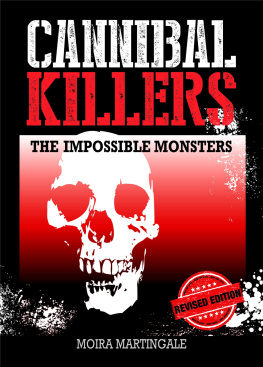
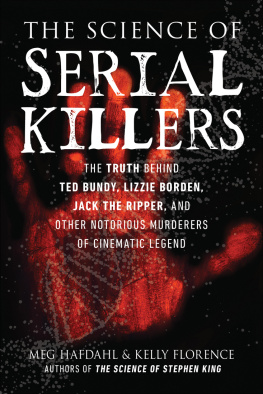





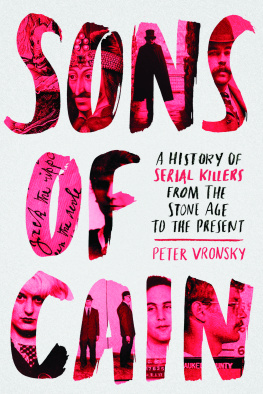

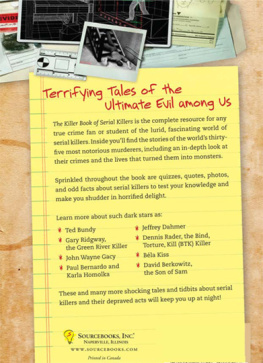
![Charlotte Greig - Evil Serial Killers. In the Minds of Monsters [Fully Illustrated]](/uploads/posts/book/70143/thumbs/charlotte-greig-evil-serial-killers-in-the-minds.jpg)
